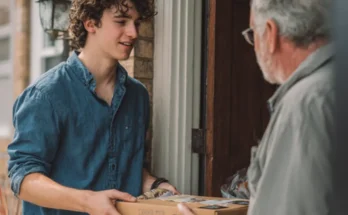I never imagined that love could cost me my home. When I married Daniel, I knew I was stepping into a blended family. He had a son, Caleb, from a previous marriage—a bright but troubled teenager with a history of academic struggles and emotional volatility. I had no illusions about becoming his second mother. I simply hoped we could coexist with mutual respect.
But that hope began to unravel the moment Daniel proposed a plan that would upend everything.
Caleb had been accepted into a prestigious private school—one with a reputation for transforming underachievers into Ivy League candidates. The catch? Tuition was astronomical. Daniel, ever the optimist, believed this was Caleb’s golden ticket. He wanted to take out a second mortgage on our house to fund it.
Our house. The one I inherited from my late parents. The one I renovated with my own savings. The one that represented stability after years of scraping by.
“I know it’s a lot,” Daniel said, eyes pleading. “But this could change his life.”
I stared at him, stunned. “You want to risk our home for a school that might not even work out?”
“He needs this,” he insisted. “He’s finally excited about something. Don’t you want to give him a chance?”
I did want Caleb to succeed. But I also knew his history—three schools in five years, each ending in suspension or withdrawal. He was brilliant, yes, but erratic. And I couldn’t ignore the way he treated me: cold, dismissive, sometimes outright hostile. He refused to acknowledge me as part of the family, and made it clear that he resented my presence.
Still, I tried. I helped him with homework. I drove him to therapy. I defended him when neighbors complained about his behavior. But nothing changed. And now, I was being asked to gamble my future on his potential.
I said no.
Daniel was furious. “You’re punishing him for not loving you.”
“No,” I replied. “I’m protecting the only thing I have left.”
The argument spiraled. He accused me of being selfish, of not understanding what it meant to sacrifice for a child. I reminded him that Caleb wasn’t my child—and that I had sacrificed plenty. My peace. My privacy. My sense of safety.
He moved out the next day.
I thought that would be the end of it. But then came the letters—from lawyers, from Caleb’s school, from Daniel himself. He was contesting the ownership of the house, claiming that since we were married, he had a right to leverage it for Caleb’s education.
I was stunned. Betrayed. And terrified.
I hired an attorney and fought back. The legal battle was brutal. Daniel painted me as a vindictive stepmother, someone who cared more about bricks and mortar than a child’s future. I countered with evidence of Caleb’s behavior, the financial risks, the emotional toll.
In court, the judge asked me one question: “Do you believe Caleb will succeed at this school?”
I paused. “I believe he could. But I don’t believe it’s worth losing my home to find out.”
Silence.
Then the ruling: the house remained mine. Daniel’s petition was denied.
I walked out of that courtroom with tears in my eyes—not of joy, but of grief. I had saved my home, yes. But I had lost my marriage. And any hope of reconciliation with Caleb.
Weeks passed. Then one day, I received a letter. From Caleb.
It was short. Apologetic. He said he understood now why I couldn’t risk everything for him. That he was angry, but not blind. That he hoped, someday, we could talk.
I didn’t reply. Not yet.
Because some wounds need time. And some homes are built not just with walls, but with boundaries.
I refuse to lose mine again.


